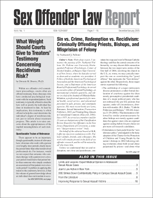Protect, Don’t Prosecute: Consensual Teen Sexting and Child Pornography Laws
Author: Amanda Reynoso-Palley.; Mary Ciera Wilson.
Source: Volume 20, Number 03, April/May 2019 , pp.33-34(2)

next article > |return to table of contents
Abstract:
Cases of “revenge porn” or “nonconsensual pornography” have become increasingly frequent. When an individual is threatened with having nude or otherwise sexually explicit photos posted online—an abusive tactic used to maintain power and control in a relationship—survivors are often left feeling isolated and defeated. Rather than criticize the behavior of the person who publicized the photos, society often blames the victim. Rather than criticize the one engaging in revenge porn, society often derides the victim for sending the photos in the first place. The dynamics of intimacy, in which parties learn to trust each other, is removed from the equation, and the power of coercion is overlooked. Moreover, the legal system has been slow to respond to the way technology intervenes in human relationships, changing the dynamics and magnifying the potential to cause harm when a relationship sours. This article examines some typical examples, analyzes the underlying social, cultural, developmental, and legal issues, and proposes some simple reforms to address the problem effectively.Keywords: Revenge Porn; Sexting; Coercive Nonconsensual Sharing; Pornography Laws
Affiliations:
1: Day One; 2: Fordham Law School.